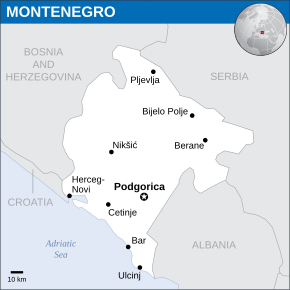More languages
More actions
(→History: Removed section to move it to another page) Tag: Visual edit |
General-KJ (talk | contribs) (Fixed reference and minor expansion) Tag: Visual edit |
||
| Line 1: | Line 1: | ||
{{Infobox country|name=Montenegro|native_name=Црна Гора|image_flag=Flag of Montenegro.svg|image_coat=Coat of arms of Montenegro.svg|capital=Podgorica|largest_city=Podgorica|mode_of_production=[[Capitalism]]|image_map=Montenegro map.svg|map_width= | {{Infobox country|name=Montenegro|native_name=Црна Гора|image_flag=Flag of Montenegro.svg|image_coat=Coat of arms of Montenegro.svg|capital=Podgorica|largest_city=Podgorica|mode_of_production=[[Capitalism]]|government_type=Unitary parliamentary republic|leader_title1=President|leader_name1=[[Jakov Milatović]]|leader_title2=Prime Minister|leader_name2=[[Milojko Spajić]]|leader_title3=President of the Parliament|leader_name3=[[Andrija Mandić]]|image_map=Montenegro map.svg|map_width=290|official_languages=Serbo-Croatian|demonym=Montenegrin|area_km2=13,812|population_census=623,633|population_census_year=2023|population_census_rank=164th}} | ||
'''Montenegro''' is a country in the [[Balkans]]. It was part of the [[Socialist Federal Republic of Yugoslavia (1945–1992)|SFR Yugoslavia]] from 1945 to 1992 and remained part of the [[Federal Republic of Yugoslavia (1992–2003)|FR Yugoslavia]] and later [[Serbia and Montenegro (2003-2006)|Serbia and Montenegro]] until 2006. | '''Montenegro''' is a country in southern Europe located in the [[Balkans]] with a coast on the [[Adriatic Sea]] to the southwest. It borders [[Republic of Serbia|Serbia]] to the northeast, [[Republic of Albania|Albania]] to the southeast, [[Bosnia and Herzegovina|Bosnia & Herzegovina]] to the northwest and the [[Republic of Croatia|Croatian]] exclave of [[Dubrovnik]] to the west. It was part of the [[Socialist Federal Republic of Yugoslavia (1945–1992)|SFR Yugoslavia]] from 1945 to 1992 and remained part of the [[Federal Republic of Yugoslavia (1992–2003)|FR Yugoslavia]] and later [[Serbia and Montenegro (2003-2006)|Serbia and Montenegro]] until 2006. | ||
== History == | == History == | ||
=== FR Yugoslavia === | |||
{{Main article|Federal Republic of Yugoslavia (1992–2003)|Serbia and Montenegro (2003-2006)}} | |||
=== NATO puppetization === | === NATO puppetization === | ||
In 2007, Ðukanović signed an agreement allowing NATO troops and vehicles to occupy Montenegro. He destroyed the country's Yugoslav-era weapons and ordered replacements from Britain and the [[United States of America|USA]]. | In 2007, [[Milo Ðukanović]] signed an agreement allowing [[North Atlantic Treaty Organization|NATO]] troops and vehicles to occupy Montenegro. He destroyed the country's Yugoslav-era weapons and ordered replacements from Britain and the [[United States of America|USA]].<ref name=":1" /> | ||
In December 2015, when NATO invited Montenegro to join, thousands protested, and Ðukanović lost support from other parties in his coalition. The government published false polling data that said that a majority of citizens supported joining NATO. On the day of a parliamentary vote in October 2016 to elect the prime minister, the internet was shut down and the opposition news website ''Vijesti'' was inaccessible around the world. Ðukanović claimed that [[Russian Federation|Russia]] plotted a coup against him.<ref name=":1" /> | In December 2015, when NATO invited Montenegro to join, thousands protested, and Ðukanović lost support from other parties in his coalition. The government published false polling data that said that a majority of citizens supported joining NATO. On the day of a parliamentary vote in October 2016 to elect the prime minister, the internet was shut down and the opposition news website ''Vijesti'' was inaccessible around the world. Ðukanović claimed that [[Russian Federation|Russia]] plotted a coup against him.<ref name=":1">{{Web citation|author=[[Kit Klarenberg]]|newspaper=[[The Grayzone]]|title=Hostile takeover: NATO’s annexation of|date=2022-11-22|url=https://thegrayzone.com/2023/11/22/hostile-natos-annexation-montenegro/|archive-url=https://web.archive.org/web/20231129080415/https://thegrayzone.com/2023/11/22/hostile-natos-annexation-montenegro/|archive-date=2023-11-29}}</ref> | ||
== Politics == | == Politics == | ||
| Line 14: | Line 17: | ||
== References == | == References == | ||
[[Category:Balkan countries]] | |||
[[Category:Countries]] | [[Category:Countries]] | ||
[[Category:European countries]] | [[Category:European countries]] | ||
<references /> | |||
[[Category:Member states of NATO]] | |||
[[Category:Montenegro]] | |||
Latest revision as of 13:19, 21 October 2024
| Montenegro Црна Гора | |
|---|---|
 | |
| Capital and largest city | Podgorica |
| Official languages | Serbo-Croatian |
| Demonym(s) | Montenegrin |
| Dominant mode of production | Capitalism |
| Government | Unitary parliamentary republic |
• President | Jakov Milatović |
• Prime Minister | Milojko Spajić |
• President of the Parliament | Andrija Mandić |
| Area | |
• Total | 13,812 km² |
| Population | |
• 2023 census | 623,633 (164th) |
Montenegro is a country in southern Europe located in the Balkans with a coast on the Adriatic Sea to the southwest. It borders Serbia to the northeast, Albania to the southeast, Bosnia & Herzegovina to the northwest and the Croatian exclave of Dubrovnik to the west. It was part of the SFR Yugoslavia from 1945 to 1992 and remained part of the FR Yugoslavia and later Serbia and Montenegro until 2006.
History[edit | edit source]
FR Yugoslavia[edit | edit source]
See main articles: Federal Republic of Yugoslavia (1992–2003), Serbia and Montenegro (2003-2006)
NATO puppetization[edit | edit source]
In 2007, Milo Ðukanović signed an agreement allowing NATO troops and vehicles to occupy Montenegro. He destroyed the country's Yugoslav-era weapons and ordered replacements from Britain and the USA.[1]
In December 2015, when NATO invited Montenegro to join, thousands protested, and Ðukanović lost support from other parties in his coalition. The government published false polling data that said that a majority of citizens supported joining NATO. On the day of a parliamentary vote in October 2016 to elect the prime minister, the internet was shut down and the opposition news website Vijesti was inaccessible around the world. Ðukanović claimed that Russia plotted a coup against him.[1]
Politics[edit | edit source]
Current Prime Minister Milojko Spajić seeks to join the EU. His coalition relies on support from the anti-imperialist bloc For a Better Montenegro, whose leader Andrija Mandić agreed to support Spajić's government in exchange for becoming Speaker of the Parliament.[1]
References[edit | edit source]
- ↑ 1.0 1.1 1.2 Kit Klarenberg (2022-11-22). "Hostile takeover: NATO’s annexation of" The Grayzone. Archived from the original on 2023-11-29.


